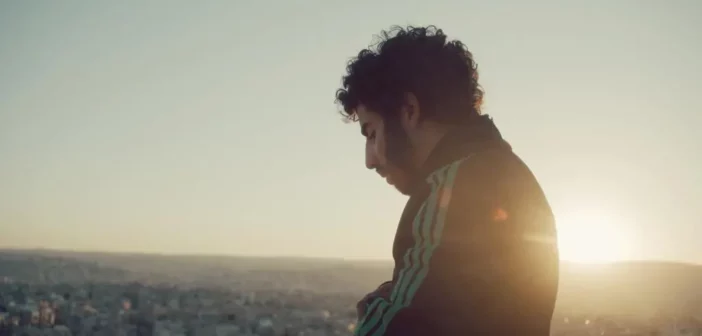'Rebel' is an insightful deep dive into the complexities of the Syrian War and the devastating consequences radicalisation has for one Belgian family.
-
9
Viewed at the World Premiere on Thursday 26 May as press for the Cannes Film Festival 2022.
450,000 Syrians have lost their lives to the civil conflict in Syria over the last decade following pro-democracy protests demanding President Assad’s resignation. When the government deployed excessive force in retaliation for the arrest and torture of teenage revolutionaries, hundreds of thousands of civilians took to the streets in protest. Violence has since escalated, with fighting decimating Syria’s capital, Damascus, and its second city, Aleppo. Adil El Arbi and Bilall Fallah’s Rebel (2022) takes a captivating dive into the surge of Islamic State jihadists who capitalised amid the chaos of this sensitive political situation.
Kamal (Aboubakr Bensaihi) is, undoubtedly, the beating heart of this action-drama; a Belgian rapper who travels to Syria as medical aid, but is later forced to join ISIS as a soldier. El Arbi and Fallah’s focus on a Belgium family – exposed to the horrors of ISIS – attempts to bridge the gap between the West and the East; violence is no longer a desensitised display, but rather seeps into European soil, seeking to destroy a family. Opening with a fictional ISIS assassination footage, featuring Kamal as a seemingly radicalised soldier, the subsequent consequences for younger brother, Nassim (the fabulously talented Amir El Arbi), and mother, Leila (Lubna Azabal), are heartbreaking. This mother-son duo is incredibly touching; deft in their utterly convincing exploration of grief and how one responds to the damning, uninformed media coverage of the war and Kamal’s involvement. What Rebel warns of, though, is how ISIS manipulates children and weaponises the media to recruit its youngest victims. It’s uncomfortable, distressing, but necessary to shed light on in the modern age.
Kamal’s story is heavily dependent on time manipulation and narrative framing which I deeply appreciated. Non-linearity allows El Arbi and Fallah to weave narrative threads between Belgium and Syria intricately, painting a picture of life before and after he travels to Syria. As an anthology – complete with a prologue, epilogue, and a self-referencing soundtrack by Hannes de Maeyer – Rebel‘s narrative is mapped through Arabic title cards and ode-like songs dedicated to the characters’ journeys. These creative decisions are reminiscent of El Arbi and Fallah’s directorial flair as showcased in prior projects, like Black (2015), Gangsta (2018), and Bad Boys for Life (2020).
But the most creative decision, though, was to use rap (sparingly, at that) as an expression of anger and frustration at both Western and Eastern governments’ inability to mitigate civilian losses and prevent further bloodshed. Robrecht Heyvaert‘s cinematography in those rap sequences is wonderfully inventive, owing itself to more of a music video, seamlessly passing between grimy nightclubs, war-torn Aleppo apartments, and the deserts of Syria (filmed in Jordan), which all could be a movie in their own right. Ultimately, Rebel‘s cinematography is visually stunning, and credit is due to production designer, Pepijin Van Looy, and set decorator, Karim Kheir, for being the architects of the film’s visceral backdrop.
If you want to be moved, go see Rebel when it’s distributed for theatrical release. Topical, emotional, and shocking . . . Rebel is a well-oiled machine in portraying the evil of ISIS propaganda and the fight against Jihadi aggression, educating audiences on the wider, and domestic, politics of radicalisation.




